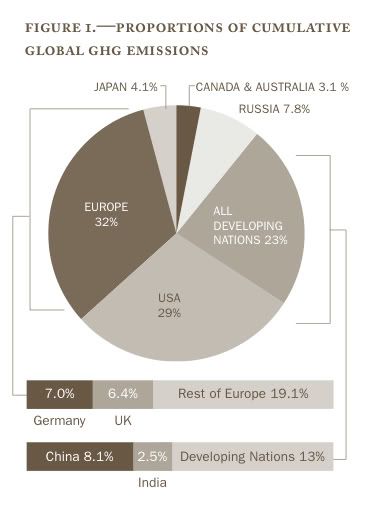America's special climate responsibility
Texas, a state that's home to 24 million people, releases more greenhouse gas pollution than the United Kingdom, a nation with 60 million residents. It also emits more than Italy or France. Louisiana, which has a population of about 4.5 million, releases more greenhouse gas pollution than Egypt, with 72.5 million people. Florida, population 18 million, releases more greenhouse gas pollution than Thailand, population 67 million. And while North Carolina has only 9 million residents, it emits more global warming pollution than 87 developing nations with a total of about 550 million people.
 These are among the eye-opening findings of a new report from the National Environmental Trust titled "Taking Responsibility: Why the United States Must Lead the World in Reducing Global Warming Pollution." The report was released in conjunction with the ongoing United Nations climate change conference in Bali, Indonesia, where delegates from 180 countries are hammering out a new greenhouse gas reduction agreement to succeed the Kyoto Protocol, which is set to expire in 2012.
These are among the eye-opening findings of a new report from the National Environmental Trust titled "Taking Responsibility: Why the United States Must Lead the World in Reducing Global Warming Pollution." The report was released in conjunction with the ongoing United Nations climate change conference in Bali, Indonesia, where delegates from 180 countries are hammering out a new greenhouse gas reduction agreement to succeed the Kyoto Protocol, which is set to expire in 2012.
Speaking at the Bali conference today, Nobel Peace Prize laureate and former Vice President Al Gore accused the United States of blocking progress on the agreement, the Associated Press reports:
"My own country, the United States, is principally responsible for obstructing progress here in Bali," said Gore, who flew to Bali from Oslo, Norway, where he received the Nobel Peace Prize for helping alert the world to the danger of climate change.
The Bush administration and its congressional allies have long objected to requirements that developed nations curb emissions without similar mandates for developing countries. But as the NET report notes, the U.S. has a special responsibility to take action since it's responsible for 27.8 percent of all historic global warming pollution, compared to just 23 percent for all developing nations' historic emissions combined.
Angela Anderson, NET's vice president for climate programs, says the good new is that many U.S. states are putting their own greenhouse gas reduction plans into place. Here in the South, they include North Carolina, South Carolina, Florida and Arkansas. But as we have reported previously, there's now an effort underway by fossil-fuel-funded think tanks to scuttle these state-level regulatory efforts. NET's report offers more evidence about why it's so critical for state policymakers to resist pressure from polluters and the pundits that do their bidding.
"The data is clear -- the United States has long been, and remains, the world's most prolific emitter of greenhouse gases," says Anderson. "We have a clear responsibility to reduce our own pollution and help poorer countries respond to the current and future impacts of global warming."
(Graphic from NET's report, "Taking Responsibility.")
Tags
Sue Sturgis
Sue is the former editorial director of Facing South and the Institute for Southern Studies.
